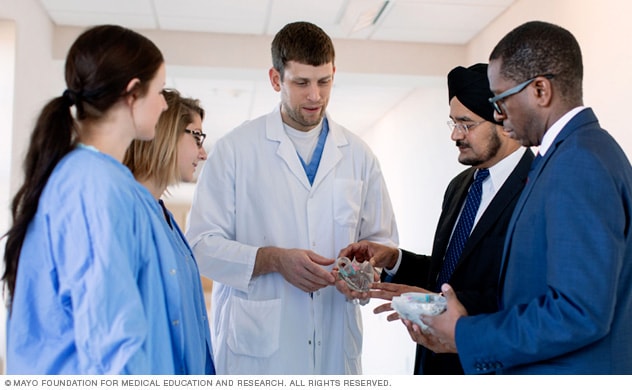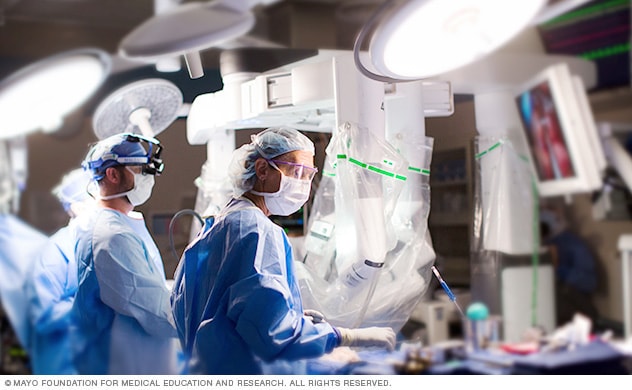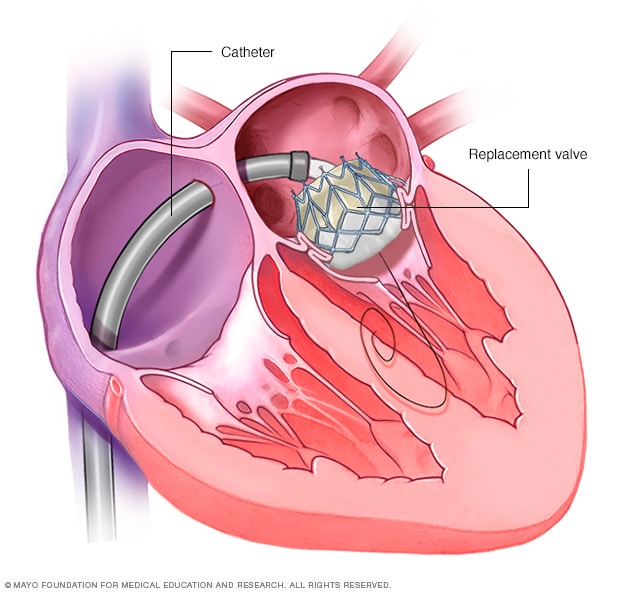Mayo Clinic's approach
 Mayo Clinic team discussion
Mayo Clinic team discussion
A multidisciplinary team of healthcare professionals at Mayo Clinic discusses research and technology, such as 3D printing of models of the heart.
At Mayo Clinic, cardiovascular surgeons work together as a team with cardiologists and other healthcare professionals to provide coordinated, comprehensive care for people who need mitral valve repair or mitral valve replacement.
Mayo doctors have been pioneers in cardiac surgery for many years. Mayo doctors in the Valvular Heart Disease Clinic have extensive experience and expertise evaluating and treating people with mitral valve disease and other heart valve diseases.
- Collaborative care. Mayo Clinic provides care for you as a whole person. Your healthcare team takes the time to get to know you and works with you to provide exactly the care you need. If you need surgery for another heart condition, surgeons may do the surgery at the same time as mitral valve repair or mitral valve replacement.
-
Advanced technology and treatment. Cardiovascular surgeons at Mayo Clinic use the most advanced treatment options for mitral valve repair and mitral valve replacement. Sometimes minimally invasive heart surgery is done. This type of surgery involves smaller surgical cuts and may allow a quicker recovery than open-heart surgery.
Minimally invasive heart surgery includes surgery done using instruments inserted through one or more small incisions in the chest, called thoracoscopic surgery. It also includes surgery done by a surgeon using robotic arms, called robot-assisted heart surgery.
Mayo Clinic interventional cardiologists may use long, thin tubes called catheters and clips or other devices to replace a mitral valve.
- Innovative research. Mayo Clinic doctors and researchers develop and test advanced technology and techniques for mitral valve repair and mitral valve replacement. Research topics have included new minimally invasive catheter procedures to repair or replace a mitral valve.
 Minimally invasive heart surgery at Mayo Clinic
Minimally invasive heart surgery at Mayo Clinic
A Mayo Clinic surgeon performs minimally invasive heart surgery using long instruments inserted through small incisions in the chest.
 Robot-assisted heart surgery team at Mayo Clinic
Robot-assisted heart surgery team at Mayo Clinic
A Mayo Clinic surgeon and surgical team help with robot-assisted heart surgery, while another surgeon sits at a remote console controlling the robotic arms.
Transcatheter mitral valve replacement

Transcatheter mitral valve replacement
Transcatheter mitral valve replacement is a minimally invasive procedure to replace a mitral valve that isn't working properly. A catheter is inserted in the leg or chest and guided to the heart. A replacement valve is then inserted through the catheter and guided to the heart. A balloon is expanded to press the valve into place.
Expertise and rankings
 Collaboration
Collaboration
A Mayo Clinic doctor and surgeon collaborate and discuss mitral valve repair and replacement.
Mayo Clinic cardiovascular and cardiothoracic surgeons in Arizona, Florida and Minnesota have extensive experience performing a wide range of cardiac surgeries, including mitral valve repair or mitral valve replacement. Mayo doctors perform more than 700 mitral valve repairs and mitral valve replacements each year.
Pediatric cardiologists and pediatric cardiovascular surgeons at Mayo Clinic's campus in Minnesota have experience treating children with mitral valve disease and other heart conditions.
Nationally recognized expertise
Mayo Clinic campuses are nationally recognized for expertise in cardiology and cardiovascular surgery:
- Mayo Clinic in Rochester, Minnesota, Mayo Clinic in Phoenix/Scottsdale, Arizona, and Mayo Clinic in Jacksonville, Florida, are ranked among the Best Hospitals for heart and heart surgery by U.S. News & World Report.
- Mayo Clinic Children's in Rochester is ranked the No. 1 hospital in Minnesota and the five-state region of Iowa, Minnesota, North Dakota, South Dakota and Wisconsin, according to U.S. News & World Report's 2025-2026 "Best Children's Hospitals" rankings.
With Mayo Clinic's emphasis on collaborative care, specialists at each of the campuses — Minnesota, Arizona and Florida — work closely with colleagues at the other campuses and the Mayo Clinic Health System.
Learn more about Mayo Clinic's cardiovascular medicine and cardiovascular surgery departments' expertise and rankings.
Locations, travel and lodging
Mayo Clinic has major campuses in Phoenix and Scottsdale, Arizona; Jacksonville, Florida; and Rochester, Minnesota. The Mayo Clinic Health System has dozens of locations in several states.
For more information on visiting Mayo Clinic, choose your location below:
Costs and insurance
Mayo Clinic works with hundreds of insurance companies and is an in-network provider for millions of people.
In most cases, Mayo Clinic doesn't require a physician referral. Some insurers require referrals or may have additional requirements for certain medical care. All appointments are prioritized on the basis of medical need.
Learn more about appointments at Mayo Clinic.
Please contact your insurance company to verify medical coverage and to obtain any needed authorization prior to your visit. Often, your insurer's customer service number is printed on the back of your insurance card.
Clinical trials
Explore Mayo Clinic studies of tests and procedures to help prevent, detect, treat or manage conditions.